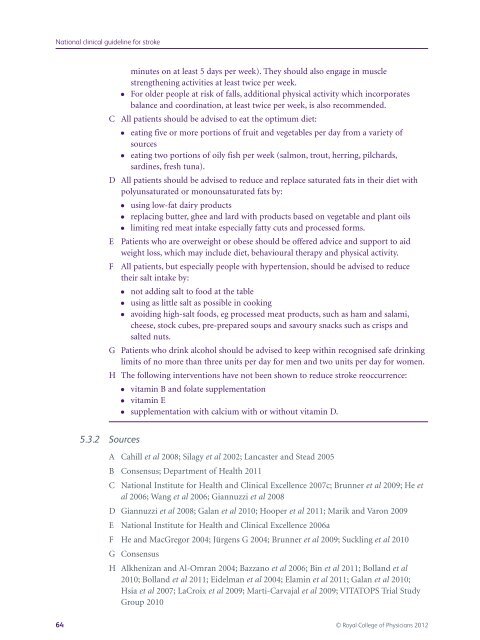national-clinical-guidelines-for-stroke-fourth-edition
national-clinical-guidelines-for-stroke-fourth-edition
national-clinical-guidelines-for-stroke-fourth-edition
Create successful ePaper yourself
Turn your PDF publications into a flip-book with our unique Google optimized e-Paper software.
National <strong>clinical</strong> guideline <strong>for</strong> <strong>stroke</strong><br />
minutes on at least 5 days per week). They should also engage in muscle<br />
strengthening activities at least twice per week.<br />
● For older people at risk of falls, additional physical activity which incorporates<br />
balance and coordination, at least twice per week, is also recommended.<br />
C All patients should be advised to eat the optimum diet:<br />
● eating five or more portions of fruit and vegetables per day from a variety of<br />
sources<br />
● eating two portions of oily fish per week (salmon, trout, herring, pilchards,<br />
sardines, fresh tuna).<br />
D All patients should be advised to reduce and replace saturated fats in their diet with<br />
polyunsaturated or monounsaturated fats by:<br />
● using low-fat dairy products<br />
● replacing butter, ghee and lard with products based on vegetable and plant oils<br />
● limiting red meat intake especially fatty cuts and processed <strong>for</strong>ms.<br />
E Patients who are overweight or obese should be offered advice and support to aid<br />
weight loss, which may include diet, behavioural therapy and physical activity.<br />
F All patients, but especially people with hypertension, should be advised to reduce<br />
their salt intake by:<br />
● not adding salt to food at the table<br />
● using as little salt as possible in cooking<br />
● avoiding high-salt foods, eg processed meat products, such as ham and salami,<br />
cheese, stock cubes, pre-prepared soups and savoury snacks such as crisps and<br />
salted nuts.<br />
G Patients who drink alcohol should be advised to keep within recognised safe drinking<br />
limits of no more than three units per day <strong>for</strong> men and two units per day <strong>for</strong> women.<br />
H The following interventions have not been shown to reduce <strong>stroke</strong> reoccurrence:<br />
● vitamin B and folate supplementation<br />
● vitamin E<br />
● supplementation with calcium with or without vitamin D.<br />
5.3.2 Sources<br />
A Cahill et al 2008; Silagy et al 2002; Lancaster and Stead 2005<br />
B Consensus; Department of Health 2011<br />
C National Institute <strong>for</strong> Health and Clinical Excellence 2007c; Brunner et al 2009; He et<br />
al 2006; Wang et al 2006; Giannuzzi et al 2008<br />
D Giannuzzi et al 2008; Galan et al 2010; Hooper et al 2011; Marik and Varon 2009<br />
E National Institute <strong>for</strong> Health and Clinical Excellence 2006a<br />
F He and MacGregor 2004; Jürgens G 2004; Brunner et al 2009; Suckling et al 2010<br />
G Consensus<br />
H Alkhenizan and Al-Omran 2004; Bazzano et al 2006; Bin et al 2011; Bolland et al<br />
2010; Bolland et al 2011; Eidelman et al 2004; Elamin et al 2011; Galan et al 2010;<br />
Hsia et al 2007; LaCroix et al 2009; Marti-Carvajal et al 2009; VITATOPS Trial Study<br />
Group 2010<br />
64 © Royal College of Physicians 2012


